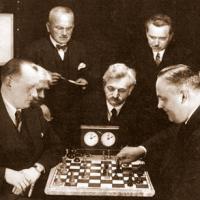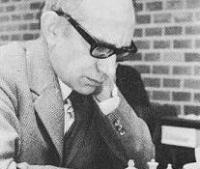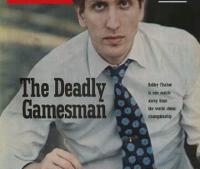
The Optimist Beloved of God
“When I play White I win because I am White, when I play Black I win because I am Bogoljubow!”
Efim Bogoljubow (April 14, 1889 - June 18, 1952) was a Russo-German chess grandmaster who won numerous events and played two matches with Alexander Alekhine for the world championship. Like so many Russians, he fled after the Revolution. But he was not one of the group that ended up in Paris. Instead, he became a naturalized German. "Bogoljubow" means "beloved of God" in Russian!
During the 1920’s he was at his height and was generally considered the world’s fourth strongest player, below Lasker, Capablanca, and Alekhine. If nothing else, though, his ego was on a par with theirs. Bogoljubow honestly believed he could win against anybody at all times! When the smart younger players started coming up, and Bogoljubov began to lose steadily against such hungry demons as Botvinnik, Keres, Fine, Flohr, Reshevsky and the others he explained: “The young people have read my book!”
After World War I, he won many international tournaments; at Berlin 1919, Stockholm 1919, Stockholm 1920, Kiel 1921, and Pistyan (Pieštany) 1922. He tied for 1st-3rd at Karlsbad (Karlovy Vary) 1923. In 1924, Bogoljubow temporarily returned to Russia, which had since become the Soviet Union, and won consecutive Soviet championships in 1924 and 1925 before relocating to Germany.
He also won at Breslau (Wroclaw) 1925, but his major international victory came at the Moscow 1925 chess tournament, where he finished 1.5 points ahead of a field that included World Champion Jose Raul Capablanca as well as Emanuel Lasker. At Kissengen 1928, he again won first prize ahead of Capablanca, and in 1929 and 1934 he played two World Championship matches with Alexander Alekhine, losing both times. In both matches he was without any chance of winning, and lost 15½-9½ in 1929 and 15½-10½ in 1934.
After that, his chess declined, having only sporadic successes. The Bogo-Indian Defence chess opening (1.d4 Nf6 2.c4 e6 3.Nf3 Bb4+) is named after Bogolyubow. He was awarded the title International Grandmaster by the World Chess Federation (FIDE) in 1951.
Reti said: … “Bogoljubow is a man of moods who plays very unequally, but surpasses all his opponents when he is the proper frame of mind. And so his playing gives one the impression of being less a result of thoroughly considered technique than a phenomenon of Nature; a wild tempestuous stream that bursts all the dikes. Thus, Bogoljubow’s confidence in himself, his infinite optimism, must be an essential factor in his success…”
It is true; Bogoljubow had a great self-confidence and besides he was the greatest optimist in Chess history. This fact has been established scientifically as the best way to achieve success both in Chess and in life!



